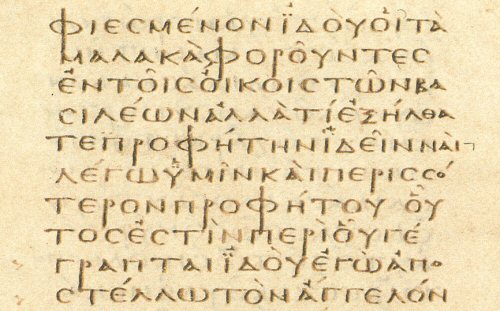Almost done with the book
As my time of reading and digesting Dr. Hill’s book “Who Chose the Gospels?”, I’m beginning to lament the last words of the book. I will be done then, and truth be told I’ve sneak-peaked the end and technically not “done”. The early history of the church and those who safe-guarded the canon of the gospels is largely not precisely known. From shadows, and and glimpses, from short little insights into the culture and insight into the situation, we can gather for the most part what was going on. Like, ok we know Irenaeus was debating Marcion on X, Y, and Z issues, and Justin Martyr wrote Trypho on issues A, B, and C, but what would have been REALLY helpful is if they answered direct questions like “Where did you get your Gospels from?” Its totally doable, but its like one of those IQ questions where it asks you, “If Susie is older than Mary, and the person standing next to Beth, is 2 years older than the person to their left, and John is their father, how old would he be?” Its not quite like that, you get my point.
Our man John
As I could not take the suspense I read ahead to the end of the book to read in his conclusion to find out exactly “Who chose the gospels?” His answer was a bit surprising, but almost as obvious as it was surprising. First, I want to add that we can trace the origin of the gospels, in its guided composition (not authorship we know who wrote them, we want to know why four, and by what criteria they used). We can trace it thinly back to the apostle John. When it comes down to 80-150 AD, hard scientific evidence comes more sparse. In fact what we have is an early church “tradition” that says John is the one who chose four, and called them the four first (I haven’t read that chapter yet….specifics to come). From him, it just got passed down to those after him, to church fathers, and eventually to those who defended the gospels, that these four are the four are the ones that the apostles authored, and can be trusted.
But if we had a group of early church fathers in front of us including John, and we asked them, “Why did you chose the four gospels?”
Nobody chose the gospels
The surprising thing about Dr. Hills conclusion was that, in answer to that question… nobody. He says, it would be like if we asked ourselves “Why did you chose your parents”? Well you didn’t, they chose you.
“The key realization which best explains our inability to find an ultimate ‘chooser’, which best explains why the church didn’t take the easy way out with some kind of singular Gospel and why it never cobbled together a set of criteria to apply to all the Gospel candidates, is that the church essentially did not believe it had a choice in the matter!”
– Dr. C. E. Hill, p. 231
In addition he says,
“When speaking of the church’s part in the process they instead use words like “receive”, recognize”, “confess”, “acknowledge”….just like the faith itself, which had been “received from the apostles and transmitted to its children” so the Gospels were “handed down” to the church by the same apostles.”
– Dr. C. E. Hill, p. 232
So there we have it. No one person, comittee, council, or prophet created the criteria for the four Gospels. We don’t know the significance of four, why God providentially chose the number four. We don’t know why God chose that point in time to insert Jesus Christ into, historically speaking. We don’t know when He is coming, like he said he was, but we do know it is good. It is very good.
The “other”s
I’ve talked about the other self-proclaimed gospels in my other articles, but I want to quickly touch on them in regards to their indirect support of the Gospels. No “other” gospel, like the gospel of Mary, or the gospel of Thomas, or any of them actually attempt to denounce the authority of the Gospels, or try to persuade their readers that the authors of the Gospels were not who they claimed to be. They all respected the club that the Gospels were in; they didn’t mess with the club. Like some outsiders trying to get in, they tried to make themselves look appealing, by opening their gospels with phrases like “These are the secret sayings that the living Jesus spoke…” (gospel of Thomas begins this way), or “The secret revelatory discourse in which Jesus spoke with Judas Iscariot…” (the gospel of Judas). None of the four Gospels are like that, they were open and public Gospels. When they were written, they were not challenged, because they were aligned with the actual set of events, and everyone knew that. Its very interesting that the outsiders didn’t try to topple the castle and build a totally new one, because they knew this castle was real, had a firm foundation and was here to stay.
More to come
I’m not done yet. I plan on reporting more as I read it. Sorry if some of this was not as orderly as it could have been. I had no thinking space tonight…..desktop cluttered, table full of material and a sowing machine (a friend was making a shirt…pretty cool). I need a “study”.


